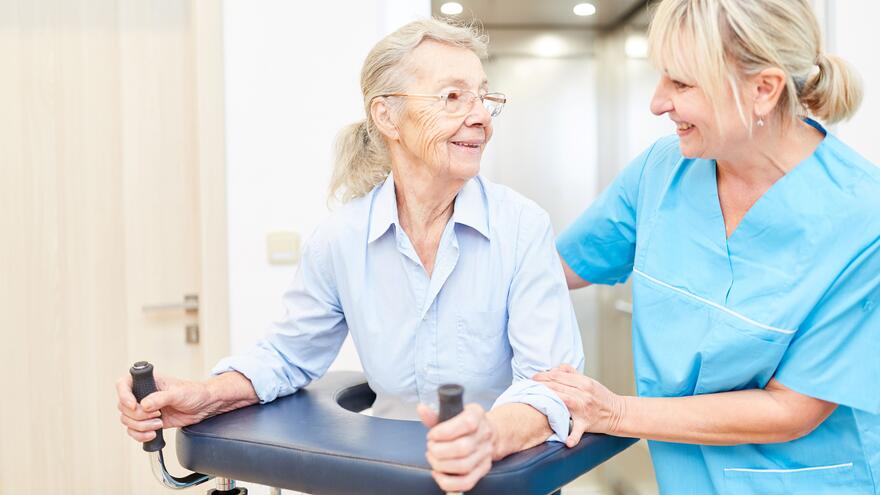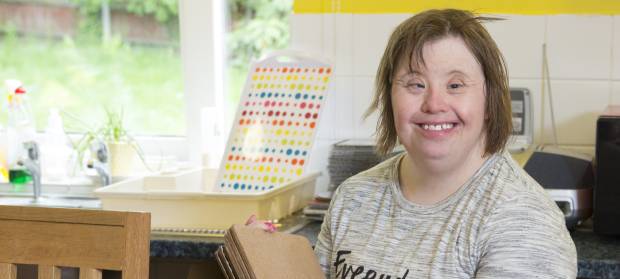Healthcare is a very important topic for people with a learning disability, as it is for the rest of the population.
But on average in the UK, people with a learning disability experience poorer health and healthcare than the rest of the general population.
Read the answers to your frequently asked questions below, or alternatively get in touch with our helpline if you have any further queries.
What are reasonable adjustments?
Equal healthcare is a basic right, meaning that everyone should have equal access to treatment. However, equal does not mean the same.
Under the Equality Act 2010, the NHS must make sure that disabled people have the same access to health services as everyone else.
This means the NHS must try to make it as easy for disabled people as anyone else to use health services. This is called making reasonable adjustments.
Reasonable adjustments are anything that is needed to make sure a disabled person gets as good a service as anyone else.
These could be physical things, such as wheelchair access in hospitals or easy read appointment letters. Reasonable adjustments could also be things like priority appointments if someone finds it difficult waiting in their GP surgery or hospital, or longer appointment times if someone needs longer with a doctor or nurse to make sure everyone understands the information they are given.
Asking your GP for an annual health check is a good way to start a conversation around the reasonable adjustments that need to be made.
Our new campaign, Treat Me Well is focused on reasonable adjustments for people with a learning disability when they are in hospital.
You may also find it useful to read our PDF guide on how to get information you can understand from health and social care services.
What is an annual health check?
An annual health check is important because it can spot health issues that need treatment before they become serious. Annual health checks also help identify any reasonable adjustments GPs can make to improve your healthcare – or the healthcare of the person you’re caring for.
Every person with a learning disability has the right to an annual health check. Quite often, people with a learning disability have a health need that isn’t met or detected - annual health checks help to spot early warnings for new conditions and monitor existing conditions.
They cover things linked to physical health and mental health, and also healthy lifestyle such as good foods to eat and doing exercise.
How do I get an annual health check?
You can arrange an annual health check by booking an appointment with your GP.
It’s recommended that GP practices send their patients a pre-health check questionnaire to help them prepare, but if you are not sent the questionnaire, you can call the surgery to ask them what to expect and what to prepare.
Annual health checks should include a health action plan, which is agreed between the patient and GP.
We know not enough people with a learning disability are having annual health checks. For more information on this, see our Don't Miss Out campaign.
How do I get a health action plan?
Annual health checks should include a health action plan, which is agreed between the patient and GP.
Health action plans outline how the patient is going to look after their health for the next year and any support they will need.
A health action plan can include referrals to specialist services, plans to see other health specialists such as dentists or opticians, or plans to improve health such as changes to eating habits.
What is a hospital passport?
A hospital passport provides key information about a patient with a learning disability, including personal details, the type of medication they are taking, and any pre-existing health conditions.
The passport also includes important information about how a person communicates and their likes and dislikes, which can be crucial when they are first admitted to hospital.
This can include any communication aids and how they can be used so that health staff can communicate in a way that is best understood. They can also show how the person expresses things such as happiness, sadness, pain and discomfort.
Hospital passports can have a big impact on treatment and care for you or the person you’re supporting. They enable health staff to understand the needs of the individual, and help them make the necessary reasonable adjustments to the care and treatment they provide.
To find out more and create your own hospital passport, visit our Health guides webpage.
Who can make decisions about my healthcare?
The person receiving the treatment should have the ultimate say over the decisions affecting their health.
Everyone can be supported to make their own decisions, unless it is determined that they do not have capacity to do so.
If it has been found that a person does not have the capacity to make a decision about their medical treatment, the doctor must follow the Mental Capacity Act and should speak to their family members and others close to them.
However, the doctor does not legally have to follow what a family member says as they are legally and ethically obliged to base their decisions on what they believe is in a person’s best interests.
To find out more take a look at our page on the Mental Capacity Act.
How can I speak to a learning disability liaison nurse?
Many hospitals have specialist learning disability liaison nurses who can work with you, your wider family and health staff to help make sure you get the best care possible for yourself or the person you care for.
While these nurses work to advise and educate other health professionals and do not take over treatment, they can help in many ways such as helping ensure that reasonable adjustments are made, advising on the Mental Capacity Act and keeping families involved with the patient’s care.
You can ask your GP surgery or hospital if they have a learning disability liaison nurse that you can speak to.
How do I meet my community learning disability team?
Many local areas have community teams that specialise in learning disability, which you might find helpful for extra support and information.
They vary from area to area, but they usually have most of the following professionals:
- learning disability nurses
- speech and language therapists
- psychologists
- psychiatrists
- social workers
- occupational therapists
- physiotherapists and dieticians.
They can also work with a wider range of professionals if needed.
Most community teams have open referrals, which means that you can contact them directly. GPs can also refer people. Criteria for accessing the services varies across different areas.
You should be able to find information on your local community learning disability team on your local council’s website.
What if there's a problem with my treatment?
If you have concerns about your treatment or the treatment of someone you care for, it’s very important that you voice your concerns. You should never be afraid to ask questions, raise concerns or even make a complaint - it could help you and others to get better treatment in the future.
You can also call Mencap's Learning Disability Helpline - our advice line - on 0808 808 1111 for free advice and a friendly ear.
If your concern is about current care or treatment, you should aim to resolve the issue informally:
- Speak to a member of staff directly involved with the treatment, or their manager. This is often the quickest way to put things right and stop them getting worse.
- Speak to the Patient Advice and Liaison Service (PALS). They provide information, advice and support to patients, families and carers and can help get answers to your questions quickly.
How do I make a formal complaint?
The formal NHS complaints procedure may be the best route to follow if:
- you have raised your concerns but they have not been fully resolved
- what happened raises serious questions about standards of care
- you wish to raise complex issues
- the issues involved concern more than one organisation.
Your local NHS complaints advocacy service can support you through the complaints process. It is free, independent and confidential, and they can offer you tailored support including the services of an advocate.
There are different advocacy service providers in different areas. The main providers are:
See our PDF guide for sorting out problems with your hospital care for more advice on what to do if you're not happy with care in hospital.
What if I'm not happy with the response to my formal complaint?
If you are not happy with a response to your formal NHS complaint and you’ve made every effort to resolve it locally, then you can make a complaint online to the Health Service Ombudsman. They will then contact you about your complaint to discuss it further.
See the NHS Complain for Change PDF guide for more information about the Health Service Ombudsman.
What support is there for people with profound and multiple learning disabilities (PMLD) to use health services?
People with people with PMLD are very likely to experience a greater and more complex range of health issues than other people. Good healthcare should enable people with PMLD to have their health needs well-managed.
This can be achieved through a combination of making reasonable adjustments to mainstream services but also through accessing a number of other specialist services.
For more information on reasonable adjustments, see the question on the topic above, but also check out our series of ‘Raising Our Sights’ guides - especially PDF guide number 4, ‘Health’.

Treat Me Well
Treat Me Well is our campaign to transform how the NHS treats people with a learning disability in hospital.
We know the treatment people with a learning disability get in hospital is still not good enough in many parts of the country. This has to change.
How to get the support you need
Phone or email our Learning Disability Helpline team for guidance and information about what support we can offer you.
Or why not take a look at our online community? This is a place for parents and family carers of people with a learning disability to share experiences, advice and support.
